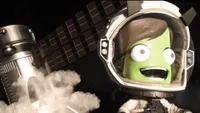'Kerbal Space Program' celebrates 9th anniversary with Enhanced Edition launch for Xbox One, Playstation 4
Kerbonauts have new space adventures ahead.
Calling all Kerbonauts! New adventures await you on gaming consoles.
The physics-based space simulator "Kerbal Space Program: Enhanced Edition Complete" is celebrating its ninth anniversary with digital launches for PlayStation 4 and Xbox One, developers Private Division and Squad announced Wednesday (Sept. 16).
American players can pick up the game bundle for $39.99 in PlayStation Store or the Microsoft Store; check your country's store for pricing and availability.
Kerbal Space Progam: Enhanced Edition - Xbox One (Save 72%!)
Save big with this launch on Xbox One in Sept. 2020 by scoring KSP: Enhanced Edition for just over $10 as a digital download on CDKeys.
"Kerbal Space Program" is often praised for its realism in depicting the space environment, such as asking players to take orbits into account when planning routes from one planet to another. A new YouTube video celebrating the anniversary says the game attracted more than 450,000 players in June 2020, and nearly 142 million vessels have launched in the space game since its foundation. The game recently launched its "Shared Horizons" expansion, which adds real-life missions by the European Space Agency to its gameplay.
The "enhanced" edition of Kerbal will give many hours of space exploration to fans old and new, including "Kerbal Space Program" and two previously published console expansions, "History and Parts Pack" with historical events and hardware and "Breaking Ground" with robotic parts, bundled at a discount.
"You have access to an array of parts to assemble fully-functional spacecraft that fly – or don't – based on realistic aerodynamic and orbital physics," Kerbal said on its website. "Launch your Kerbal crew into orbit and beyond – while keeping them alive – to explore moons and planets in the Kerbol solar system, constructing bases and space stations to expand the reach of your expedition."
Players can build their space programs in three modes. Science mode allows you to perform experiments to create new technology and advance knowledge. Career mode covers all aspects of building a space program, from construction to funding to strategies. Sandbox will let you build any spacecraft you can imagine, using any parts or technology the game has available.
Breaking space news, the latest updates on rocket launches, skywatching events and more!
Kerbal is also a popular game among space streamers, including Scott Manley – who aims to teach orbital mechanics and space science on his channel – and "Everyday Astronaut" Tim Dodd, who brings developments in spaceflight to a wide audience.
A sequel, Kerbal Space Program 2, is in the works now and due for a release in fall 2021.
Follow Elizabeth Howell on Twitter @howellspace. Follow us on Twitter @Spacedotcom and on Facebook.

Elizabeth Howell (she/her), Ph.D., was a staff writer in the spaceflight channel between 2022 and 2024 specializing in Canadian space news. She was contributing writer for Space.com for 10 years from 2012 to 2024. Elizabeth's reporting includes multiple exclusives with the White House, leading world coverage about a lost-and-found space tomato on the International Space Station, witnessing five human spaceflight launches on two continents, flying parabolic, working inside a spacesuit, and participating in a simulated Mars mission. Her latest book, "Why Am I Taller?" (ECW Press, 2022) is co-written with astronaut Dave Williams.


